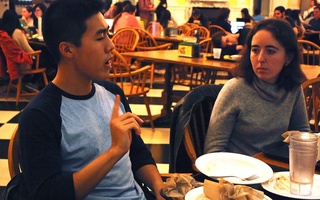A common perception of the deaf community is that all deaf people sign. But the three deaf undergraduates at Harvard College do not.
These three students do not consider themselves "culturally deaf," meaning that they do not use sign language, nor do they define themselves primarily by their lack of hearing.
And it may be these differences that enable them to be among the lucky 1600 who matriculate each year.
With the help of interpretation services at the Student Disability Resource Center (SDRC), their ability to speak and read lips allows them to interact normally with hearing students and teachers.
Aside from these and a few other limitations, the students say being deaf at Harvard has little bearing on their level of academic or social success.
But these students all attended mainstream secondary schools, where they relied on their lip reading skills for many of their daily tasks. In part, the success of these students may be due to this experience in an integrated setting, as well as to a more academically rigorous secondary education.
In general, specialists in the field of deaf education acknowledge that mainstream schools may be more likely to provide the type of educational opportunities that a Harvard student may need. But, at the same time, they say, mainstream schools can be socially isolating, which can impede academic success.
Harvard, as a mainstream college, seems to attract very few deaf students overall, and particularly lacking are culturally deaf students. This scarcity has been self-perpetuating, as culturally deaf students, like any minority group, seem more likely to opt for schools with a strong deaf community, shying away from schools like Harvard where they would be forced to be part of the mainstream.
Deaf Resources at Harvard
According to Eunice J. Chang '00, Jessica H. Fong '99 and Munir Zilanawala '01, the inability to hear has not been a major obstacle to success at Harvard. All three praise the quality and accessibility of the College's interpretation services.
Through the SDRC, students with a range of disabilities can request services to aid them with all aspects of college life. In the case of students who are hard of hearing, the center is equipped to interpret classes, speeches, meetings and other events that are part of normal student life in a variety of ways, including American Sign Language (ASL), signed English, Computer Aided Real-Time (CART) reporters and cued speech transliteration.
In addition, the SDRC provides a variety of specific in room services--including a flashing fire alarm, and a vibrating alarm clock--to accommodate the needs of hearing impaired students.
According to Chang, the quality of the center's services was part of her decision to come to Harvard.
"I was pretty impressed by the level of interpreters that Harvard offered," she says.
When she arrived at Harvard, Chang says she first requested cued speech transliteration of her classes--a process in which interpreters use eight hand shapes and four facial positions to represent sounds.
Read more in News
Memories of Harvard Give Bhutto StrengthRecommended Articles
-
Deaf Poet Wows PBHAHarvard students were treated to a unique combination of art, motion and speech last night at a poetry reading sponsored
-
Despite Demand for Class, Harvard Ignores SignThe third most common language in the United States is no longer part of the Harvard curriculum, despite high student
-
Miller Awarded Deaf Athlete Of the Year for Second TimeAfter winning 10 medals at this summer's World Games for the Deaf in Sofia, Bulgaria, a Harvard varsity swimmer has
-
 Deaf Students Utilize Resources, But Still Face Barriers
Deaf Students Utilize Resources, But Still Face Barriers -
Harvard to Offer American Sign Language Course in FallThe University has been slow to re-adopt ASL compared to peer institutions after it abandoned the program in 1994, citing financial difficulties. According to a recent study commissioned by the Modern Language Association, as of 2013 ASL is the third most-enrolled language, besides English, in colleges across the nation.













